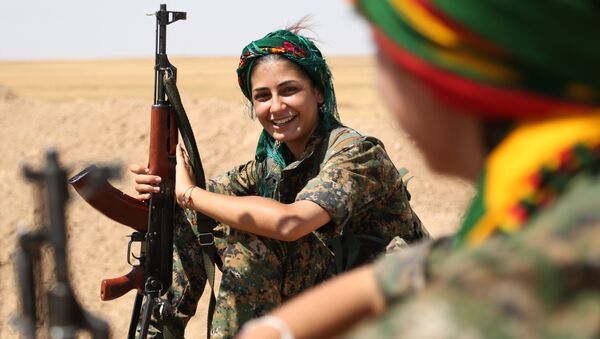Ivan Nikolaev — Women fighting alongside men against radical Islamism clearly demonstrate the alternative ideology necessary for the ultimate defeat of Daesh, in addition to the bombs pounding Syria and Iraq.
In order to get a deeper understanding of the Rojava (“The West,” as Syrian Kurds refer to the lands they inhabit) Amazons, it is necessary to understand their ideology.
"Rojava" means "west". "bakur"= "north" basur = south and rojhelat =east". we use these words to talk about kurdish parts.
— Cahit Storm (@cahitstorm) November 13, 2014
In the oversimplified and essentially incorrect view popular with Western media, the women of Rojava joined the men in fighting for freedom because their homes, families, and lives were threatened by Daesh terrorists.
The active engagement of women not only in military, but also in all walks of life in Rojava is embedded into the ideology of the influential Syrian Kurdish party, the Democratic Union Party (PYD).
After reading Benedict Anderson's Imagined Communities, Ocalan abandoned nationalism. https://t.co/BevuiFNx80 pic.twitter.com/9GZbap6tKh
— Verso Books (@VersoBooks) December 14, 2015
Based on democratic confederalist principles elaborated by Abdullah Ocalan, the founding father of the notorious Kurdish Worker’s Party (PKK) in Turkey, the PYD introduced self-governing structures across the three territories in which they live along the Turkish border they call the Kobani, Jazira and Afrin cantons.
The social contract, or the Constitution, adopted across the three Rojava cantons in early 2014, during the infamous Kobani siege by Daesh, guarantees freedom of expression, stimulates self-governance and the direct process of democracy. Gender equality goes naturally with the proclamation.
They lead the war, they lead the politics; the #women in Rojava (West /Syrian Kurdistan) are leading a revolution. pic.twitter.com/CgKYNT7hOJ
— Joan Salihi (@joansalihi) February 19, 2015
This would sound like common demagogy, especially when the mostly traditional distribution of gender roles in this part of the world are taken into account. However, the standoff, to the death, by the locals with the Daesh mujahedeen without international assistance, and at a time when the self-governance of Rojava was being created, speaks for itself.
If not for the inspiring ideology of freedom mobilizing the Rojavan people of all nationalities and religions, the decisive battle of Kobani could have ended very differently.
Syriac female fighter fighting ISIS in Al-Hol picture taken by @Delilsouleman #HSNB #MFS pic.twitter.com/Lh4sJMGvF4
— ܙܝܢܘܒܝܐ الزباء (@BetZabbai) November 6, 2015
It is important to note that the society of Rojava is markedly polyethnic, and each national and religious group, whether Arab, Assyrian, Aramean, Armenian, Chechen or Turkoman — along with the Kurd majority — have representation at all levels across the self-governing territories. Moreover, all groups possess the right and ability to teach and use their own languages, as numerous international reports suggest.
Festival of The Mother Tongue in Rojava — Kurdish, Assyrian, & Arabic. MT @shamsashahin #Twitterkurds pic.twitter.com/WxVhfpKBuE
— Doloroso (@Pynnha108) October 31, 2015
One such report is a joint statement by an international academic delegation of prominent ethnologists and scholars who visited the de-facto autonomous region in December 2014.
“In Rojava, we believe, genuinely democratic structures have indeed been established,” the online statement reads. “Not only is the system of government accountable to the people, but it springs out of new structures that make direct democracy possible: popular assemblies and democratic councils. Women participate on an equal footing with men at every level and are now able to organize in autonomous councils, assemblies, and committees to address their specific concerns. The women of Rojava we met embodied empowerment, self-confidence, and pride.”
The legitimate Syrian government of Bashar Assad has agreed not to confront Rojava, while the three self-declared cantons acknowledge their inclusion in the Syrian republic. As a result, Rojavans are not regarded as separatists, and are no threat to Damascus or Syrian sovereignty.
"Democratic autonomy:you create your autonomy, in spite of the dominant systems that are around you."-Dilar Dirik on self-governance #Rojava
— Liam Barrington-Bush (@hackofalltrades) April 27, 2015
The secular ideology of Rojava is a working example of the peaceful coexistence of different religions and ethnic groups in the Middle East. A brilliant addition to anti-Daesh coalition efforts, the female fighters of Rojava can be regarded as a visible symbol of the struggle for a decisive victory over the intolerance, bigotry and radicalism inculcated by Daesh, al-Nusra and their like.
One of the most famous speeches we have heard from a Kurdish woman in Rojava who is fighting ISIS. pic.twitter.com/QJzydqBOdw
— Dr Partizan (@DrPartizan_) November 22, 2015


